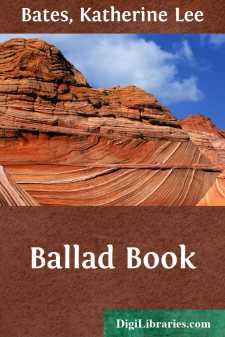Categories
- Antiques & Collectibles 13
- Architecture 36
- Art 48
- Bibles 22
- Biography & Autobiography 813
- Body, Mind & Spirit 142
- Business & Economics 28
- Children's Books 17
- Children's Fiction 14
- Computers 4
- Cooking 94
- Crafts & Hobbies 4
- Drama 346
- Education 46
- Family & Relationships 57
- Fiction 11829
- Games 19
- Gardening 17
- Health & Fitness 34
- History 1377
- House & Home 1
- Humor 147
- Juvenile Fiction 1873
- Juvenile Nonfiction 202
- Language Arts & Disciplines 88
- Law 16
- Literary Collections 686
- Literary Criticism 179
- Mathematics 13
- Medical 41
- Music 40
- Nature 179
- Non-Classifiable 1768
- Performing Arts 7
- Periodicals 1453
- Philosophy 64
- Photography 2
- Poetry 896
- Political Science 203
- Psychology 42
- Reference 154
- Religion 513
- Science 126
- Self-Help 84
- Social Science 81
- Sports & Recreation 34
- Study Aids 3
- Technology & Engineering 59
- Transportation 23
- Travel 463
- True Crime 29
Ballad Book
Description:
Excerpt
INTRODUCTION
The development of poetry, the articulate life of man, is hidden in that mist which overhangs the morning of history. Yet the indications are that this art of arts had its origin, as far back as the days of savagery, in the ideal element of life rather than the utilitarian. There came a time, undoubtedly, when the mnemonic value of verse was recognized in the transmission of laws and records and the hard-won wealth of experience. Our own Anglo-Saxon ancestors, whose rhyme, it will be remembered, was initial rhyme, or alliteration, have bequeathed to our modern speech many such devices for "the knitting up of the memory," largely legal or popular phrases, as bed and board, to have and to hold, to give and to grant, time and tide, wind and wave, gold and gear; or proverbs, as, for example: When bale is highest, boon is nighest, better known to the present age under the still alliterative form: The darkest hour's before the dawn. But if we may trust the signs of poetic evolution in barbarous tribes to-day, if we may draw inferences from the sacred character attached to the Muses in the myths of all races, with the old Norsemen, for instance, Sagâ being the daughter of Odin, we may rest a reasonable confidence upon the theory that poetry, the world over, finds its first utterance at the bidding of the religious instinct and in connection with religious rites.
Yet the wild-eyed warriors, keeping time by a rude triumphal chant to the dance about the watch-fire, were mentally as children, with keen senses and eager imagination, but feeble reason, with fresh and vigorous emotions, but without elaborate language for these emotions. Swaying and shouting in rhythmic consent, they came slowly to the use of ordered words and, even then, could but have repeated the same phrases over and over. The burden—sometimes senseless to our modern understanding—to be found in the present form of many of our ballads may be the survival of a survival from those primitive iterations. The "Blaw, blaw, blaw winds, blaw" of The Elfin Knight is not, in this instance, inappropriate to the theme, yet we can almost hear shrilling through it a far cry from days when men called directly upon the powers of nature. Such refrains as "Binnorie, O Binnorie," "Jennifer gentle an' rosemaree," "Down, a down, a down, a down," have ancient secrets in them, had we ears to hear.
One of the vexed questions of criticism regarding these refrains is whether they were rendered in alternation with the narrative verses or as a continuous under-song. Early observers of Indian dances have noted that, while one leaping savage after another improvised a simple strain or two, the whole dancing company kept up a guttural cadence of "Heh, heh, heh!" or "Aw, aw, aw!" which served the office of musical accompaniment. This choral iteration of rhythmic syllables, still hinted in the refrain, but only hinted, is believed to be the original element of poetry.
In course of time, however, was evolved the individual singer....


